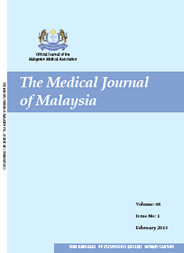MJM, Vol 70 Supplement 1 September 2015
Antenatal education and postnatal support
intervention programme can improve breastfeeding outcomes and maternal
breastfeeding self-efficacy: a quasi-experimental study
*Department of Community Health, Faculty of Medicine, UKM Medical Centre, Malaysia, **Public Health Department, Ministry of Health, Malaysia, ***Negeri Sembilan State Health Office, Malaysia
ABSTRACT
Introduction: The aim of the study is to investigate the combined effects of a new antenatal education and postnatal support programme based on Breastfeeding Self-efficacy Theory on maternal breastfeeding self-efficacy level, breastfeeding duration and exclusivity up to six months postnatal period.
Methods: A quasi-experimental study based on pre- and post-tests design was conducted among antenatal Malay mothers (n=203) divided into the intervention (n=100) and control (n=103) groups. Both groups received current standard breastfeeding education and support. Participants in the intervention group received two additional sessions of antenatal education classes followed by two sessions of postnatal proactive short message services (SMS) support. Breastfeeding exclusivity and the duration involved were measured using self-administered questionnaires up to six months postnatal. Maternal breastfeeding self-efficacy was measured in a four-time period; during antenatal, one month, three months and six months postnatal.
Results: The intervention group had significantly higher percentages of exclusive breastfeeding at one month (97.9%) when compared to the control group (49.0%). This was similarly seen at two months (80.2% versus 31.6%), three months (69.8% versus 18.4%), four months (59.4% versus 15.3%), five months (52.1% versus 13.3%) and six months (50.0% versus 12.2%) respectively. In addition, respondents in the intervention group were less likely to stop exclusive breastfeeding (Hazard Ratio = 0.28, 95% Confidence Interval: 0.19 – 0.41) and overall breastfeeding (Hazard Ratio = 0.21, 95% Confidence Interval: 0.12 – 0.38) than respondents in the control group. The effect of time (ƞ2= 0.302) was greater than the effect of the intervention itself (ƞ2= 0.067) on maternal breastfeeding self-efficacy across the six months postnatal period.
Conclusion: Antenatal education integrated with postnatal support significantly improved breastfeeding exclusivity up to six months postnatal period. However, longer duration of SMS postnatal support is essential to ensure the effectiveness of the programme on maternal breastfeeding self-efficacy up to six months period.
Keywords: Antenatal education, postnatal support, quasi-experimental study, breastfeeding outcomes, exclusive breastfeeding.
